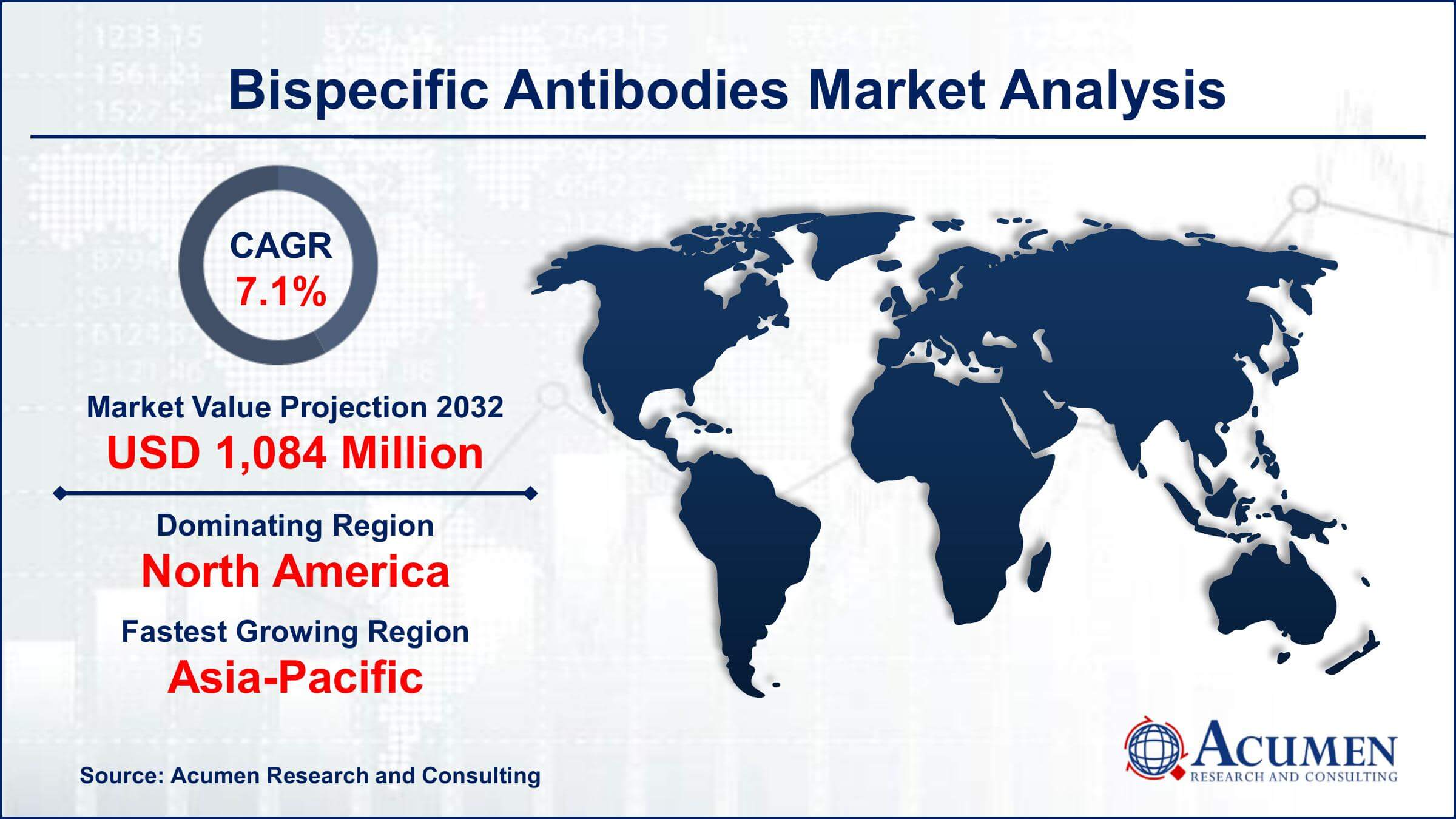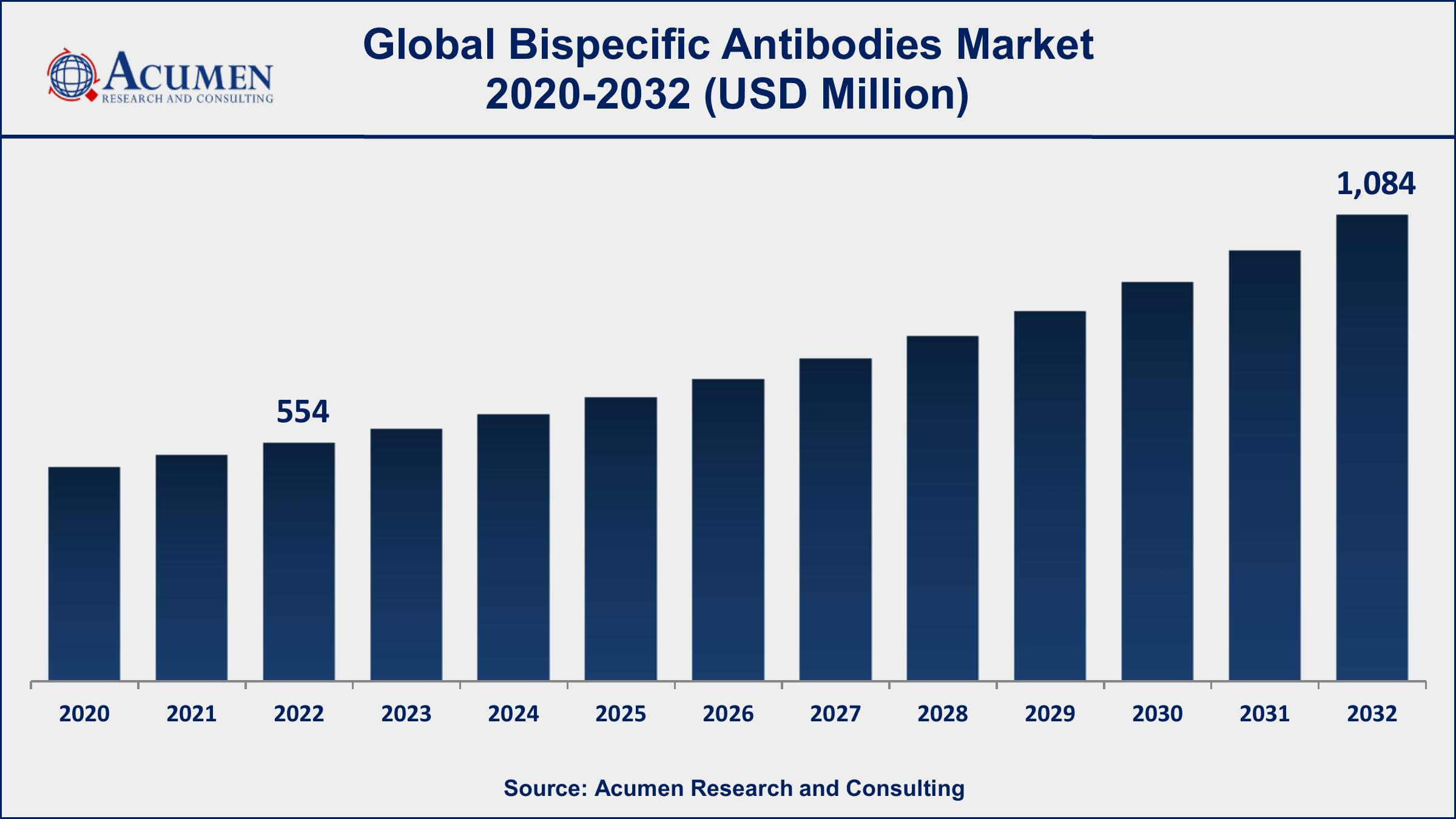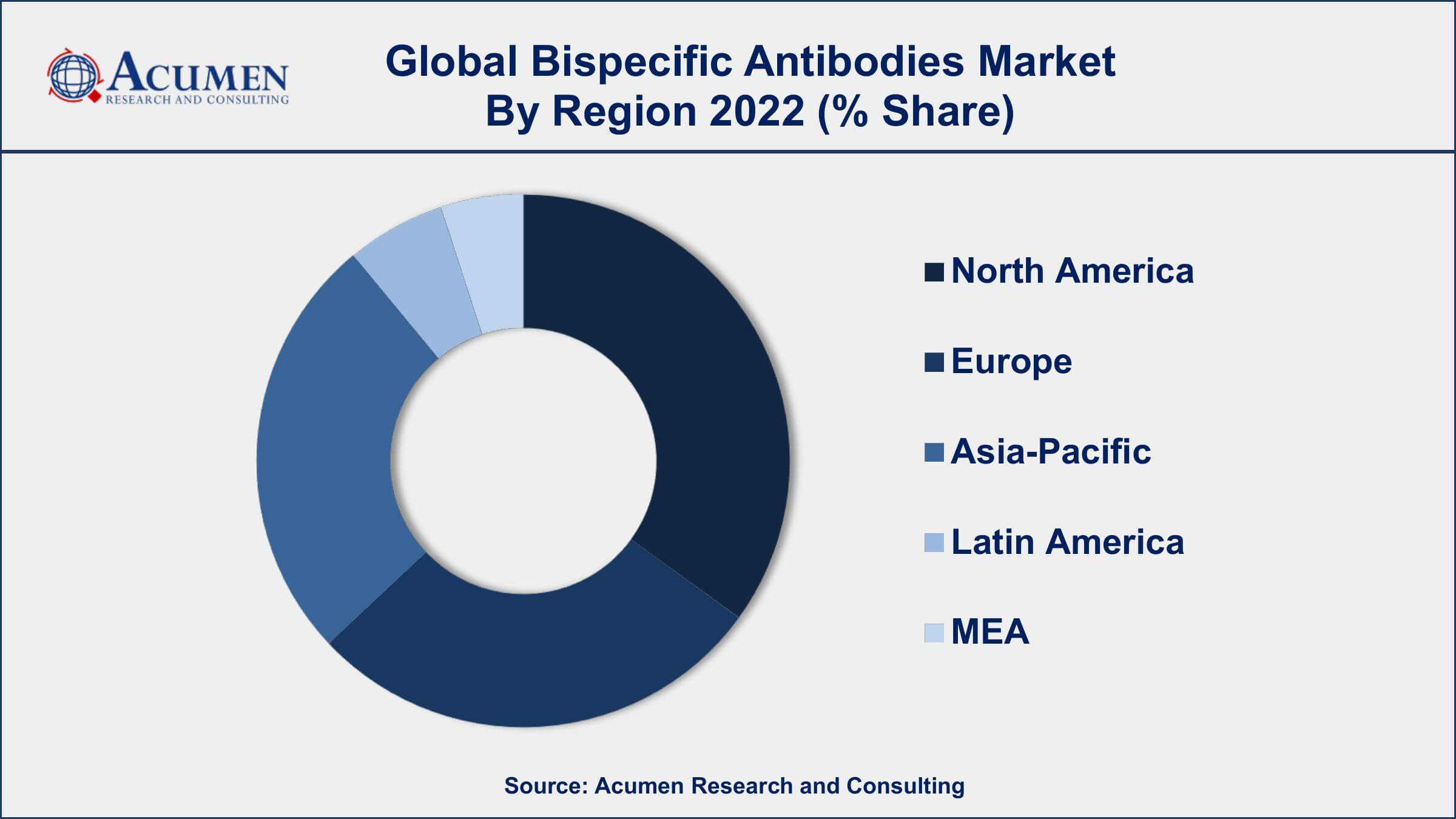December 2024
Bispecific Antibodies Market Size accounted for USD 554 Million in 2022 and is projected to achieve a market size of USD 1,084 Million by 2032 growing at a CAGR of 7.1% from 2023 to 2032.
The Global Bispecific Antibodies Market Size accounted for USD 554 Million in 2022 and is projected to achieve a market size of USD 1,084 Million by 2032 growing at a CAGR of 7.1% from 2023 to 2032.
Bispecific Antibodies Market Highlights

Bispecific antibodies are a class of engineered therapeutic molecules designed to simultaneously bind two different targets, typically two different proteins, with high specificity. This dual targeting capability allows bispecific antibodies to engage multiple pathways or cell types, making them promising candidates for treating various diseases, including cancer, autoimmune disorders, and infectious diseases. By binding to both targets, bispecific antibodies can enhance the efficacy of treatments by enhancing immune responses, blocking harmful interactions, or delivering therapeutic payloads to specific cells. They offer the potential to create more tailored and potent therapies compared to traditional monoclonal antibodies that target only one molecule.
The market for bispecific antibodies has experienced significant growth in recent years due to their potential to address unmet medical needs and offer innovative treatment strategies. The rising demand for precision medicine and targeted therapies, particularly in oncology, has driven investment and research in the field of bispecific antibodies. These molecules have shown promising results in clinical trials, with some demonstrating improved efficacy and reduced side effects compared to traditional treatments. Additionally, advances in antibody engineering technologies and manufacturing processes have contributed to the development of bispecific antibodies, making them more feasible for large-scale production.

Global Bispecific Antibodies Market Trends
Market Drivers
Market Restraints
Market Opportunities
Bispecific Antibodies Market Report Coverage
| Market | Bispecific Antibodies Market |
| Bispecific Antibodies Market Size 2022 | USD 554 Million |
| Bispecific Antibodies Market Forecast 2032 | USD 1,084 Million |
| Bispecific Antibodies Market CAGR During 2023 - 2032 | 7.1% |
| Bispecific Antibodies Market Analysis Period | 2020 - 2032 |
| Bispecific Antibodies Market Base Year | 2022 |
| Bispecific Antibodies Market Forecast Data | 2023 - 2032 |
| Segments Covered | By Drug Type, By Indication, And By Geography |
| Regional Scope | North America, Europe, Asia Pacific, Latin America, and Middle East & Africa |
| Key Companies Profiled | Regeneron Pharmaceuticals, Inc., Amgen Inc., Roche Holding AG, Genentech, Inc., Novartis AG, Pfizer Inc., Merck & Co., Inc., Eli Lilly and Company, Abbvie Inc., Jounce Therapeutics, Inc., MacroGenics, Inc., and Xencor, Inc. |
| Report Coverage |
Market Trends, Drivers, Restraints, Competitive Analysis, Player Profiling, Covid-19 Analysis, Regulation Analysis |
Bispecific antibodies are a class of therapeutic molecules that possess the unique ability to simultaneously bind to two distinct targets, such as two different proteins or cell types. This dual specificity makes them versatile tools in the field of biomedicine. By bringing together two separate functionalities into a single molecule, bispecific antibodies can exert a range of therapeutic effects that are not achievable with traditional monoclonal antibodies. Their applications span various medical domains, and they hold great promise in the treatment of various diseases, including cancer, autoimmune disorders, and infectious diseases.
The applications of bispecific antibodies are diverse and impactful. In cancer therapy, these antibodies can be engineered to bind both tumor cells and immune cells, enhancing the body's immune response against cancerous growths. This approach, known as immune checkpoint blockade, can help overcome the suppression of immune defenses by cancer cells and result in potent anti-tumor effects. Bispecific antibodies also offer potential in autoimmune disorders by selectively targeting immune cells involved in the pathological immune response, while sparing healthy cells. Additionally, in infectious diseases, bispecific antibodies can be designed to neutralize pathogens by binding to both the pathogen and a host cell receptor, preventing infection and propagation.
The bispecific antibodies market has exhibited remarkable growth in recent years, driven by their potential to revolutionize treatment approaches across various medical domains. These unique therapeutic molecules, designed to simultaneously target two distinct antigens, offer a novel paradigm for addressing complex diseases such as cancer and autoimmune disorders. Their ability to engage multiple pathways, enhance immune responses, and precisely modulate cellular interactions has sparked significant interest from both pharmaceutical companies and the medical community. One of the key factors fueling the market's growth is the rising demand for targeted and personalized therapies. Bispecific antibodies provide a versatile platform to tailor treatments for specific patient populations, minimizing off-target effects and maximizing therapeutic benefits.
Bispecific Antibodies Market Segmentation
The global Bispecific Antibodies Market segmentation is based on drug type, indication, and geography.
Bispecific Antibodies Market By Drug Type
In terms of drug types, the catumaxomab segment has seen significant growth in the recent years. Catumaxomab's growth can be attributed to its innovative approach to addressing a specific medical need. Malignant ascites, a condition characterized by abnormal fluid accumulation in the abdominal cavity due to cancer, has limited treatment options. Catumaxomab's ability to engage T cells to attack EpCAM-expressing tumor cells while simultaneously recruiting immune cells to eliminate excess ascitic fluid has provided a unique therapeutic avenue. As a result, it has gained attention as a potential solution for patients with limited treatment options and a significant unmet medical need. This segment's growth is also driven by the clinical success and positive outcomes observed in studies focused on catumaxomab's efficacy in malignant ascites management. The therapy has showcased its potential in extending survival and improving patients' quality of life, thus garnering interest from both medical professionals and patients alike.
Bispecific Antibodies Market By Indication
According to the bispecific antibodies market forecast, the cancer segment is expected to witness significant growth in the coming years. Bispecific antibodies hold immense promise in revolutionizing cancer treatment by offering innovative ways to harness the immune system against tumors and enhance the efficacy of existing therapies. This has spurred a surge of interest and investment in developing bispecific antibodies specifically tailored for various types of cancer. One of the key factors contributing to the growth of bispecific antibodies in the cancer segment is their ability to target multiple pathways simultaneously. By engaging both cancer cells and immune cells, bispecific antibodies can enhance the immune response against tumors while minimizing off-target effects. This dual targeting approach has shown potential in overcoming tumor resistance and improving overall treatment outcomes. Bispecific antibodies also provide opportunities to combine different mechanisms of action, such as immune checkpoint inhibition and tumor targeting, leading to synergistic effects and potentially overcoming resistance mechanisms that cancer cells might develop.
Bispecific Antibodies Market Regional Outlook
North America
Europe
Asia-Pacific
Latin America
The Middle East & Africa

Bispecific Antibodies Market Regional Analysis
North America's dominance in the bispecific antibodies market can be attributed to a combination of factors that have converged to create a favorable environment for growth and innovation in this field. The region's advanced healthcare infrastructure, robust research ecosystem, and strong pharmaceutical industry have collectively propelled North America to the forefront of the bispecific antibodies market. North America boasts a well-established biopharmaceutical industry with a history of pioneering advancements in drug development and biotechnology. Major pharmaceutical companies headquartered in the United States and Canada have been at the forefront of investing in research and development of innovative therapies, including bispecific antibodies. These companies have the financial resources and expertise to drive the development, clinical trials, and commercialization of novel therapies, thereby contributing significantly to North America's leadership in the market. Moreover, the region benefits from a thriving academic and research landscape, with prestigious universities, medical centers, and research institutions that foster collaboration between academia and industry. This synergy has led to cutting-edge discoveries in immunology, antibody engineering, and oncology, all of which are integral to the development of bispecific antibodies. Collaborative efforts between academic researchers and industry experts have accelerated the translation of scientific knowledge into practical applications, positioning North America as a hub for biotechnology innovation.
Bispecific Antibodies Market Player
Some of the top bispecific antibodies market companies offered in the professional report include Regeneron Pharmaceuticals, Inc., Amgen Inc., Roche Holding AG, Genentech, Inc., Novartis AG, Pfizer Inc., Merck & Co., Inc., Eli Lilly and Company, Abbvie Inc., Jounce Therapeutics, Inc., MacroGenics, Inc., and Xencor, Inc.
Looking for discounts, bulk pricing, or custom solutions? Contact us today at sales@acumenresearchandconsulting.com
December 2024
September 2023
November 2020
October 2020